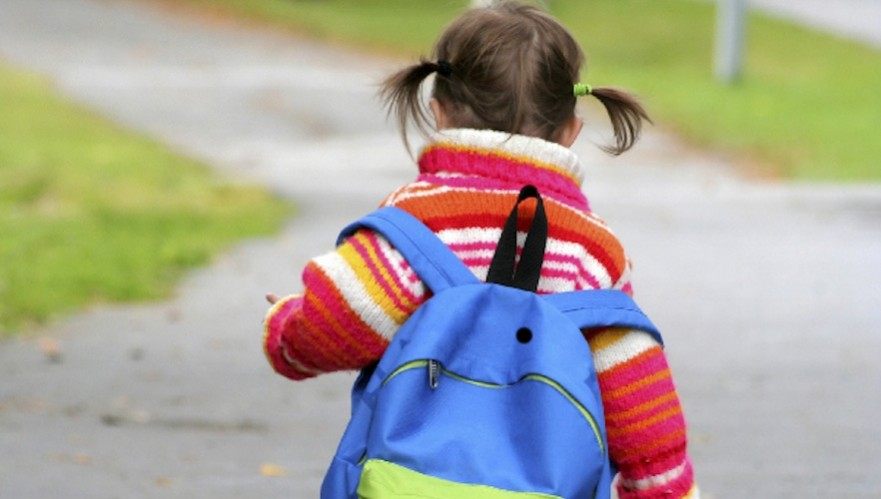The Social Side of School Readiness
Social and emotional school readiness tips from Brenda Nixon and Deborah McNelis
My little girl is starting kindergarten and while she knows her ABCs and 123s better than I do, I wonder if she’s ready…socially. Is she emotionally mature enough to handle this big transition? I’ve since found out that there really is no “one size fits all” answer here, but to help us better understand the social side of kindergarten readiness, I was lucky enough to tap into the wisdom of two parenting and school readiness experts, Brenda Nixon, MA, and Deborah McNelis, M.S.ed. Every child is different, but here are five reassuring signs that your child (and mine) is emotionally prepared for a great year. — Jacqueline, TMC Producer
Sign 1: Your child is curious to learn new things and can adapt to new situations.
Many schools hold an informal kindergarten orientation night where children are able to meet their classmates and explore the classroom. In this setting, take time to observe your child, looking for signs that your child’s curiosity is stronger than his fear of the unfamiliar. Even if he is shy, is he still willing to wander around the room, looking at bulletin boards, touching the toys and games, and maybe even talking to some of the other kids? If your school doesn’t offer something like this, spend an afternoon visiting a new playground. Once you arrive, hang back to see how your child responds to a new environment and unfamiliar kids.
Sign 2: Your child can work independently for short periods of time.
Give your child some Play Doh and then go busy yourself in another part of the room. How long before she calls you over to look at what she is doing? When you tell her that snake bracelet is lovely and walk away again, is she able to return to her “work”? Kindergarten classes generally have a higher student to teacher ratio than most daycare and preschool classes. Do you get the sense that your child will be able to cope with other children competing for the teacher’s attention? If your child behaves differently around you than around other adults (which is normal), arrange a play date with a mom friend and have her run the Play Doh experiment. If your child is in daycare or preschool right now, simply ask her current teacher where she is with this milestone.
Sign 3: Your child can express her own needs and feelings.
Can your child adequately communicate her physical needs: that she needs to use the bathroom, needs a tissue to blow her nose, or didn’t receive a juice at snack time? If another kid in the class does or says something hurtful, will your child know how to respond appropriately–including knowing to tell the teacher (and you)? These are skills, of course, that children spend a great deal of time working on in kindergarten, but signs of budding self-expression are important even before the school year begins.
Sign 4: Your child willingly shares materials and recognizes that others have feelings.
Taking turns at being the lunch helper, sharing toys and crayons, apologizing for hurting someone else’s feelings…kindergarten is, in many ways, a year-long lesson in the art of getting along together. At this age, it’s normal to still remind kids that they need to share, but children should demonstrate some level of delayed gratification and a sense of fairness. Likewise, children should be able to recognize when they overstep these bounds–and be able to apologize for hurting someone else’s feelings. This is another great playground or play date experiment. How does your child respond when she inevitably goofs up? Does she offer an apology or some other simple “Oops, I’m sorry” acknowledgment?
Sign 5: Your child accepts guidance from teachers and is able to follow one- and two-step directions.
Especially if your child’s kindergarten is part of a larger elementary school, he will likely be in contact with multiple teachers (his primary teacher plus gym, art, library, etc.) over the course of a normal day. Interacting with so many different adults–with different teaching styles–can ultimately strengthen a child’s ability to relate to adults and will definitely test their listening skills. But how well does your child interact with “authority figures”, for lack of a better term? Can she follow simple directions when a verbal instruction is given or does she need more one-on-one direction? Just don’t know? There may be no better time than right now to indulge your child in an afternoon game of pretend school.
Brenda Nixon, M.A., author of The Birth to Five Book: Confident Childrearing Right from the Start, is a former preschool teacher and certified parent educator whose parenting advice has appeared in Parenting, USAToday Weekend, Good Housekeeping, and Mothering magazine. She is also the host of the The Parent’s Plate internet radio show.
Deborah McNelis, M.S.ed, is the author of Help Me Thrive While I’m Five: Making Connections With Your Five Year Old, part of The Brain Development series, and the creator of BrainInsights activity packets. Deborah has taught preschool and kindergarten and served as Early Childhood Specialist for the Wisconsin Council on Children and Families.
The Mother Company aims to support parents and their children, providing thought-provoking web content and products based in social and emotional learning for children ages 3-6. Check out the first episode of our children’s series, “Ruby’s Studio: The Feelings Show,” which helps kids identify, express, and move through their feelings. We want to be a parenting tool… For you!
Posted in: Expert Advice, Health & Wellness, Modern Parenting, School